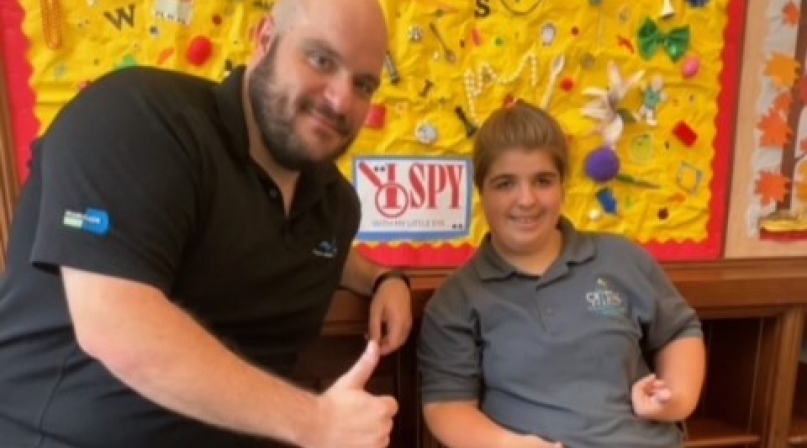Miami-Dade County libraries offer sensory-friendly programs

Key Takeaways
Miami-Dade County Librarian Miriam Quiros-Laso reads “The Very Hungry Caterpillar” to a crowd of children, some of whom are fixated on fidget toys, playing with puppets or blowing bubbles. Story time is one of the dozens of programs the library system has revamped to be more sensory-friendly for neurodiverse residents.
Quiros-Laso’s 18-year-old son is on the spectrum, and she created sensory friendly story times at the Coral Gables library branch before Miami-Dade County passed a resolution to make its systems “autism-friendly and neurodiverse inclusive,” which expanded sensory-friendly programming to all of the county’s libraries.
“I was thinking about, ‘I love doing story time. How can I make my son comfortable in story time? What would he like? What wouldn’t he like? What would trigger him?’” Quiros-Laso said. “And it was thinking outside the box and thinking of things that we could incorporate within our story times to make it more enjoyable [for people on the spectrum].”
Staff in all 50 of Miami-Dade County’s libraries go through training (Autism Spectrum Disorder and Strategies for Inclusivity training), which is provided by the University of Miami and the Nova Southeastern University Center for Autism and Related Disabilities (CARD). The library’s sensory-friendly programming includes initiatives geared toward those on the spectrum, including social clubs for young adults with intellectual and/or developmental disabilities and a sensory pop-up art experience, as well as clubs such as Junior Environmental Rangers and Cosplay DIY, which are for both neurotypical and neurodiverse youth.
Programs are often created out of feedback from library-goers who make suggestions about what they want out of the space, Quiros-Laso said.
“They’ll come in and hang out and it’s like, ‘Well, what do you like? What do you want to see at the library?’” Quiros-Laso said. “And then we cater the programming to that.
“… So, do they like to play board games? Do they like to just chill? It’s just giving them the space where they’re comfortable being themselves, and they’re not singled out.”
The goal wasn’t to completely reinvent what the library offers, but to make adjustments to existing programming so that a broader range of people could participate, Quiros-Laso said.
“With enhancing story time, it was just reworking the way we do things and looking at the bigger picture of everything … and being more aware — considering light, considering sound,” Quiros-Laso said. “Maybe some sounds are too loud, some pitches are too high, so you need to adapt based on the kids.
“[You have to think about] how you’re going to introduce a puppet, how you’re going to introduce bubbles — things that are super simple to us, but you can have a child that can have a meltdown because they’re afraid of the bubbles, which has happened before, so it’s how you introduce different things and transition between them.”
Library sensory kits, which include fidget strings, squeezable toys, noise reducing earmuffs and other objects that are intended to soothe neurodiverse individuals, are available at all of the county’s libraries and are often used during story times, according to Quiros-Laso.
The Miami-Dade County Library system also posts on its website “social narratives,” which are online brochures structured like a picture book, to give neurodiverse people a detailed breakdown of what to expect before going to the library. The “social narratives” give a tour of each library branch, showing locations such as the computer area and quiet space, and providing explainers for how to get a library card and how to check out books.
The Doral, Key Biscayne and South Dade Regional library branches are building separate autism-friendly spaces, which will have special lighting as well as furniture designed with those on the spectrum in mind, according to Ray Baker, director of the Miami-Dade County Library System.
Students at Crystal Academy, a Miami-Dade County therapy center and school for children with autism and developmental delays, have library cards and attend story time at the Coral Gables branch.
“They’re really taking into consideration many things,” said Maria Palacio, a co-founder of Crystal Academy who also has a child on the spectrum. “The interaction, the music, the sensory part of it, it shows that they have really committed to understand the public and who actually goes to the library and how to cater to different personalities and needs.”
Four Crystal Academy students are set to volunteer at the Coral Gables Library, where they will gain experience shelving and organizing books, to give them job experience and prepare them for the workforce. Each student will undertake tasks that cater to their personalities and interests, Palacio said. One student is adept at building things, so they might help build bookshelves or chairs for the library. Another student is very verbal and social and will help set up the library’s story time. Therapists from the school will accompany them, according to Baker.
“I’m very grateful for the opportunity and the energy that we got,” Palacio said. “It’s not, ‘I’m doing a favor, because we have to do it, and we have to be inclusive.’
“They’re giving the neurodiverse population a chance to succeed and have self-worth, which we all want to actually feel that we’re valuable — I think that’s a beautiful thing. And if it can be done in one library, it can be done in all of them.”
The Miami-Dade County Library System won the 2024 “Best in Category” Achievement Award in the Library category.
Related News

County Countdown – Dec. 15, 2025
Every other week, NACo's County Countdown reviews top federal policy advocacy items with an eye towards counties and the intergovernmental partnership.
Stretching small opioid settlement allocations helps funding do more
States and localities are set to receive $56 billion in opioid settlement dollars over an 18-year period, but not every county that receives settlement funding will get enough to build out infrastructure.
County News
Library Book-Purchasing Model Solves Collection Drain


